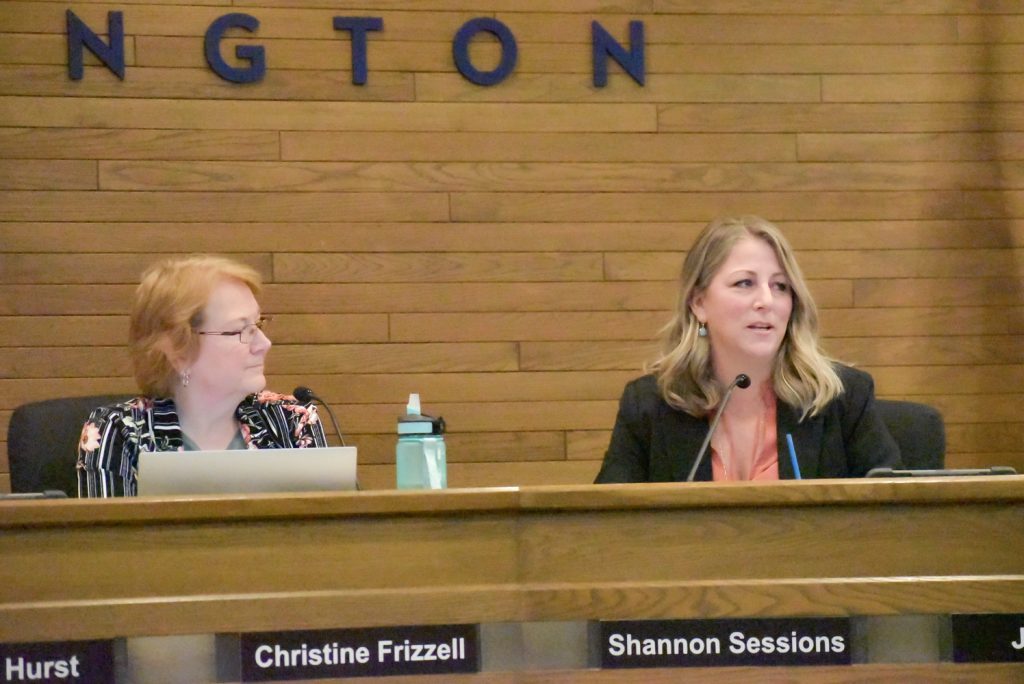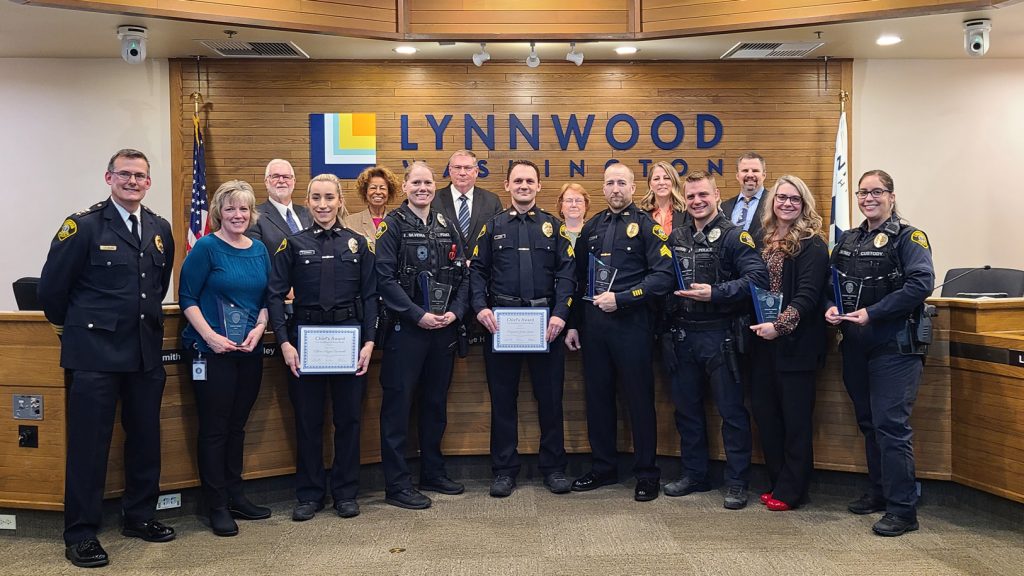LYNNWOOD, Wash., December 14, 2022━The Lynnwood City Council passed amended versions of the 2023 salary schedule and 2023-2024 biennium budget during their December 12 meeting. The ordinances were delayed at the previous meeting on November 28. With all council members present at the meeting, Council Vice President Smith was the only dissenting vote to approve the 2023-2023 Lynnwood Biennium Budget.
The $545 million biennium Lynnwood budget passed with amendments discussed largely in the previous meeting:
- An ADA Title II and Title VI consultant — $120,000
- IT and AV expansion for the community court — $132,000
- Cybersecurity service — $150,000
- Four full-time master custody officers — $792,500
These amendment items come to a total of $1,194,500. Also, the council unanimously approved Council President Hurst’s motion of transferring $2 million from the Transportation Benefit District Fund 150 to the Transportation Capital Fund 360.
The Master Custody Officer, a new position within the Lynnwood Police Department, will provide a second level of supervision and fill-in when a supervisor is on vacation or on a training course. Lynnwood Police Chief James Nelson told the Lynnwood Times that he should be fulfilling this position next year.
“The Council has been committed to that [CJC Program] the entire way and I appreciate that,” Chief Nelson said when asked for a statement on the council approving a budget amendment for four full-time master custody officers.
A large portion of time for the budget discussion was dedicated to the salary schedule that passed unanimously with two major amendments.
The council did not pass the salary schedule cost-of-living adjustment (COLA) increase of 8.5% suggested by staff, with discussion being contentious at times. The motion to approve an amendment with a COLA increase to 4% for 626 and 627 pay grades (upper-level and deputy public works director positions) and an 8% increase for all other pay grades was passed 5-2 with Councilman Joshua Binda and Councilwoman Shannon Sessions dissenting.
“I don’t think we need the city administration and staff telling the council how they should be paid,” Council President George Hurst said. “I think it’s the reverse. The council should be looking at salaries and benefits because it’s such a large part of the expenditures of our general fund. We want to be fair and I think this council will be fair.”
Hurst proposed an amendment to the salary schedule to set the COLA increase to 8%, arguing against exceeding the 8% rate represented employees would receive based on the agreement with AFSCME/AFL-CIO Local 3035.
“I’m not going to say it’s dangerous, but I think it sets a bad precedent to go above what the union contracts have been given,” Hurst said. “I think we need to respect the unions by acknowledging that 8%, right now, is a fair increase in salary.”
There was, however, an exception to this 8% increase. Hurst maintained that the highest paid non-represented employees, the 626 and 627 pay grades, should receive a smaller COLA increase of 4%.
According to the 2023 salary schedule ordinance, 627 are upper-level positions that include: the finance director; development and building services director; city administrator; human resources director; parks, recreation and cultural arts director; and public works director. The only 626 listed in the ordinance is the deputy public works director.

Councilmember Shannon Sessions disagreed with Hurst, stating that all pay grades should receive the same percentage increase.
“The 8% across-the-board for all of them still benefits the lower levels,” Sessions said. “But you (Hurst) contradicted yourself when you said that these directors who’ve been working here… doing a great job for our city deserve a reward of better longevity, however, you’re going to cut their COLA in half.”
The contradiction Sessions referred to was Hurst’s mention of redoing the pay scale in a way that rewards employees for staying with the city longer. He refuted, stating that while 8% across-the-board would be equal, it is not equitable.
“An 8% increase for a salary at $200,000 is a bump of $16,000,” Hurst said. “An 8% increase for a salary of $70,000 is about $5,600. If you start bringing that level down… I think you’re moving towards more of an equitable salary structure.”
According to Finance Director Michelle Meyer, the city currently maintains an “intended distance of 10% between each grade” and that “unintended overlap” between grades was a reason for concern with varying COLA rates.
“In layman’s terms, it sounds as though the concern is that the individuals who make less money will begin catching up with those who make more money,” Councilmember Patrick Decker said. “In the past, there was a deliberate attempt to have these levels of separation between the different roles. I don’t know why there is a mandate that we maintain that at 10%…
“10% is a round number,” Decker continued. “That makes me think that at some point it’s an arbitrary number that was selected and decided upon. I don’t know that there is any gospel to that particularly.”
Other council members spoke of further separation of pay grades.
“The reality is that not every single director should be at the same level,” Council Vice President Jim Smith said. “I don’t know how that ever came about, but it’s not smart business.”
Smith reasoned that some department directors have more responsibilities. One such example was larger departments that require additional personnel management.
“Different positions have different pay grades because of the job description,” Smith said.
Regardless of disagreements, it is clear that the majority of council members are considering a complete restructure of the city’s pay and benefits scale in the coming year. This sentiment is apparently shared by the mayor as well.
“I know the mayor sent out an email suggesting that she also wanted to look at salaries and benefits for the city,” Hurst said.
The council also approved an amendment with a vote of 5-2 to eliminate the Neighborhood and Community Affairs position from the salary schedule that has not been filled for over ten years. Councilwomen Sessions and Altamirano-Crosby were the dissenting votes.
Police Department Spotlight and Annual Awards

Lynnwood Police Chief James Nelson presented annual awards to several officers on Monday. Below is a very brief summary as we will be highlighting these officers in a separate article.
- Clerk of the Year: Morgan Cole
- Custody Officer of the Year: Chelsie Martinez
- Officer of the Year: Matthew Saul
- Rookie of the Year: Brooke Silveira
- Staff Person of the Year: Robyn Carey
- Supervisor of the Year: Zac Olesen
- Chief’s Award: Sgt Justin Gann and Officer Aggie Barnwell
- Tenure Awards: Robert Robeson, 25 Years of Service
- Core Value Awards
- Professionalism: Tyler Gaskin
- Vigilance: Matthew Saul
- Community: Tiffany Krusey
OTHER BUSINESS
- Ordinance: 2021-2022 Final Budget Amendments: Motion to approve by Councilwoman Session, 2nd by Councilwoman Julieta Altamirano-Crosby. Motion Passes (7-0).
- Ordinance: Code Amendment Organics Procurement: Motion to approve by Council President Hurst, 2nd by Council Vice President Smith. Motion Passes (7-0).
- American Rescue Plan Act Subrecipient Contract Approvals: Motion to approve reimbursements by Council Vice President Smith, 2nd by Councilwoman Julieta Altamirano-Crosby. Motion Passes (7-0). The reimbursements were as follows:
- Lynnwood Food Bank – $400,000
- Hero’s Cafe – $5,000
This poll is no longer accepting votes
Author: George Ftikas Jr.










4 Responses